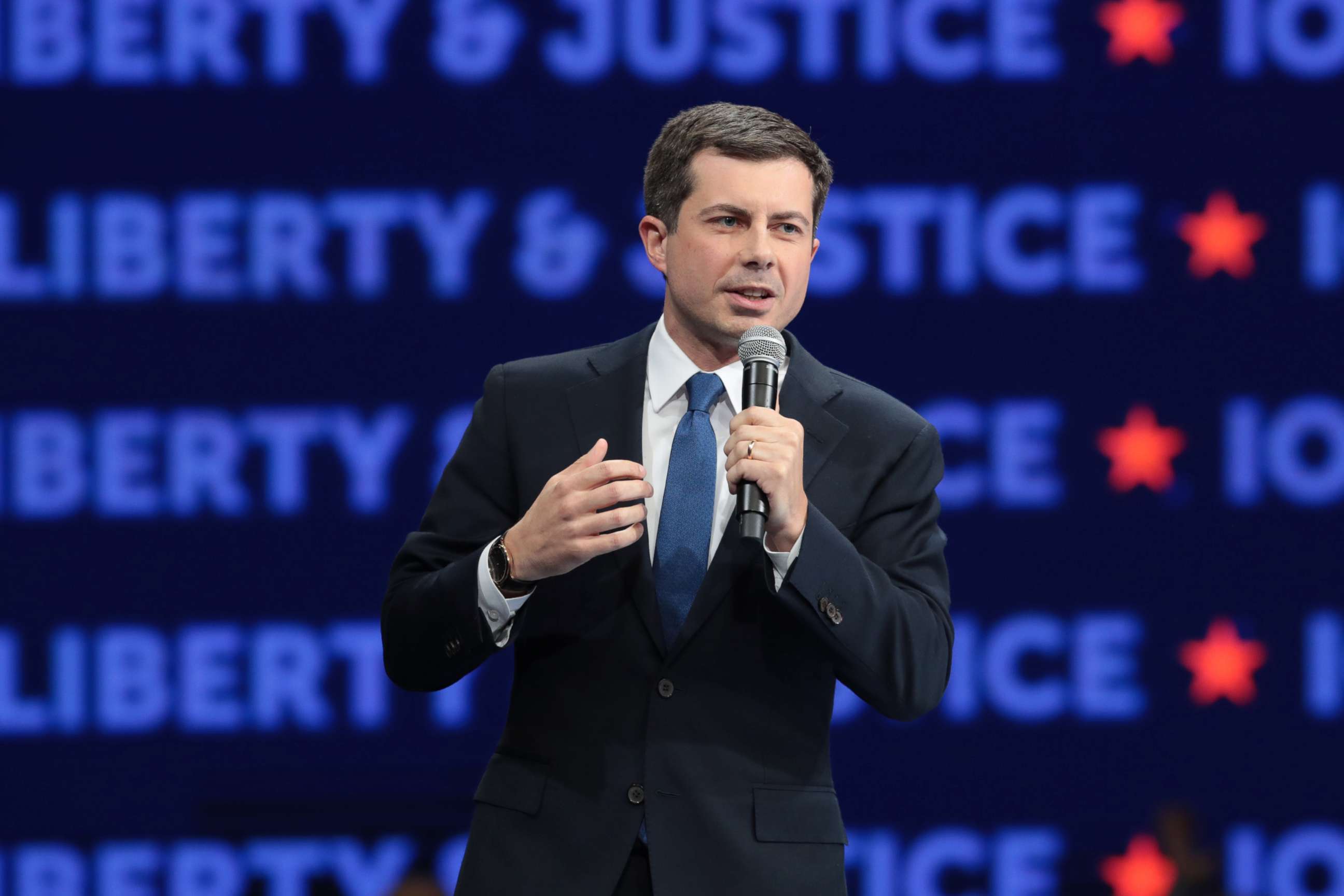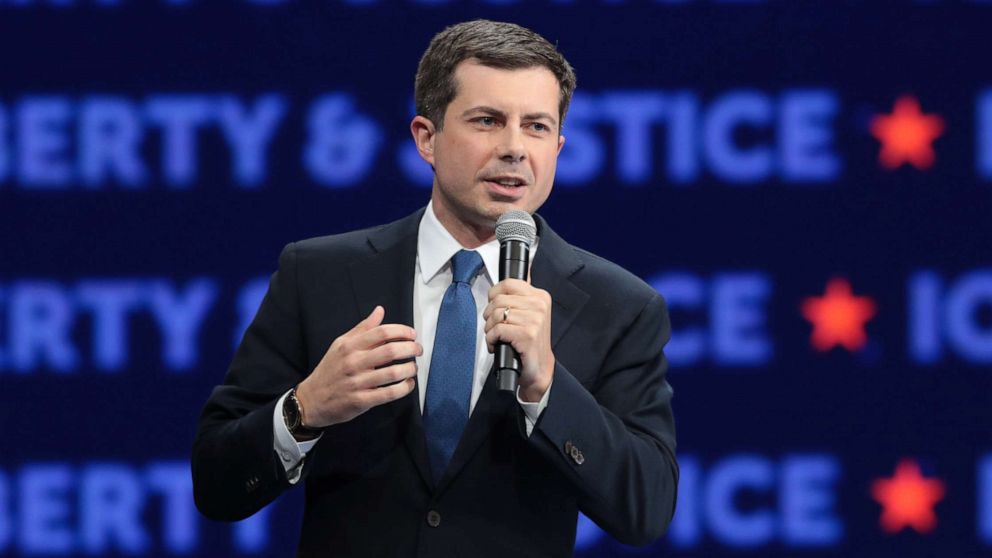Buttigieg calls the math 'controversial' in Warren's Medicare for All plan
South Bend, Indiana, Mayor Pete Buttigieg, criticized Sen. Elizabeth Warren's "Medicare For All" plan on ABC's "This Week" on Sunday, calling the math on how to pay for the plan "controversial."
"What is just not true is that hers is the only solution," he told ABC News Chief Anchor George Stephanopoulos. "This 'my way or the highway' idea, that either you're for kicking everybody off their private plans in four years or you're for business as usual, it's just not true. I'm proposing Medicare for all who want it. Now, if we do that, that's the biggest change in American health care in 50 years."
Warren released a plan on Friday that addressed funding for Medicare for All that consisted of two parts: an estimate of what single-payer, government-run health care would cost and how Warren would pay for it without raising "one penny" of taxes on middle-income Americans.
"Well, the math is certainly controversial," Buttigieg said on "This Week" Sunday. "Again there are variations in the estimates in the trillions and trillions and trillions of dollars, and we don't have to go there in order to deliver health care to everybody."
The South Bend, Indiana, mayor previously expressed his support for Medicare for All in 2018, but is now campaigning on "Medicare for All Who Want It," which keeps private insurance and offers a government version of Medicare to all Americans as well.
"I think it (Medicare for All) could very well be the long-run destination, but I think there's got to be some humility in our policy here. Let's put this out there and see if it's really the best plan for everybody. I think it will be the best plan, but I'm not willing to assume that it is the right plan for you out of Washington and order you to take it whether you want to or not. If it's the right plan, then everybody will move to it until it is the single payer. And if it's not the right plan for everybody, then we're going to be really glad we didn't kick some Americans off their private plans."
He said his plan would be paid for with a combination of rolling back some Trump administration tax cuts while avoiding kicking people off their plans.

Asked by Stephanopoulos if he could guarantee that his plan would not raise taxes on middle class Americans, Buttigieg said, "everything that we have proposed has been paid for, and we have proposed no tax increase on the middle class."
Buttigieg says the biggest difference between him and Warren is that he is best able to "deliver major, meaningful, bold change to move" the country forward.
"We're going to need a president who can pick up the pieces, who can bring the country together and who -- who can do it while dealing with these major crises from climate to an economy that isn't working for everybody."
On the campaign trail, Buttigieg often expresses his concern over debt, telling voters that in his lifetime "some of those financial time bombs might go off." Pressed by Stephanopoulos that if all of his plans are implemented, it would actually increase debts and deficits, Buttigieg said everything he's proposed "will be neutral to the budget."
"I'm not going to make a $20 trillion move on health care, when we can do the same thing for a fraction of the cost."
But the race is not simply between Buttigieg and Warren. Still in a crowded field of over a dozen Democratic competitors, the Midwestern mayor said, "I'm proud to be part of the most diverse field I think ever in in Democratic presidential politics and some formidable competition."
Less than 100 days until the Iowa caucus, a new ABC News-Washington Post poll finds Buttigieg in fourth place, behind former Vice President Joe Biden and Sens. Warren and Bernie Sanders.
"I can sense that there's just a different energy right now. I think early on Iowans were just getting to know us; now I think folks are making decisions," Buttigieg said. "And I can tell that the image I'm asking people to think about, that question of the day after -- and not just how do we end the Trump administration, but what comes next -- was really resonating with people."
On the bus in Dubuque, Iowa, Buttigieg told Stephanopoulos on "This Week" that his recent surge in the polls is a result of voters getting to know him and his campaign.
"There's an amazing energy behind our campaign right now we're seeing it on the ground here in Iowa, we're seeing it pick up in a lot of places, and I think voters are really narrowing down their choices and instead of just getting to know us now they're really making up their minds and we're getting tremendous response for my message of bold changes that we can also get together, my campaign is based on the idea."
A New York Times/Siena College poll released this week shows him in third place with 18% support among likely Iowa caucus-goers, just 4% behind Warren, the top choice.
Despite his rise in polls, the mayor is still having trouble attracting black voters to his events and polling shows little support behind him. In the past months, Buttigieg has hired a state director and increased his staff to over 30 in South Carolina, where that voting bloc is crucial to winning the state's primary.
Asked by Stephanopoulos how he could convince the community to give him a shot, Buttigieg said, "I think the way to win black voters -- or any voters -- is to deserve to win."
"My message is of making sure that this is a country where we tear down systemic racism in all of its forms, because I think that threatens the entire republic. The plan I have put forward, the Douglass Plan, is as ambitious as the Marshall Plan that rebuilt Europe, but this time right here at home. And it's for the purpose of tearing down systemic racism."
A leaked memo surfaced last month, showing that the campaign conducted internal focus groups in South Carolina with results suggesting that, "being gay was a barrier." Participants said they were uncomfortable discussing Buttigieg's sexual orientation and did not like when he mentioned that he has a husband.
That New York Times/Siena College poll also showed that 55% of likely Iowa voters believe it would be harder for a gay candidate to beat Trump.
The mayor avoided directly answering Stephanopoulos's question on what he thought about his sexual orientation playing a factor in this race, but said the biggest question on voter minds is how their life will be different by the person they choose to become president.
"That's the question we have got to answer. And when we have the best answer to that question, I think a lot of prejudices and a lot of those other considerations fall away, and it comes down to vision and results."
If Buttigieg is ultimately the nominee for the Democratic Party, he's referenced his readiness to take on President Donald Trump in the general election. Over the late summer, Buttigieg started to shift his message to electability, saying the attacks from the president will not work on him.
"He'll try to talk about Washington. The beauty is, I don't work in Washington, I'm not from Washington. I'm from right here in the Midwest," Buttigieg said at a town hall in Dubuque, Iowa, in September. "Sometimes this president, sometimes literally, will have the flag and throw a military parade for himself. And let me tell you, if they wanted to debate national security, I can't wait because I've seen worse incoming than a misspelled tweet."
During the final game of the World Series, Trump released an ad focusing on the general election that touted job creation, slashing illegal immigration and "obliterating" the Islamic State.
In response to the ad, Buttigieg said, "it's trying to put a tough guy coating on a very weak individual."
"I'm ready to go toe-to-toe with this president. He wants to talk about the economy, let's talk about the GM workers and other workers that he has sold out. He wants to talk about ISIS, let's talk about how his terrible decision to betray our allies allowed ISIS fighters to go free," Buttigieg said. "This president has been a failure, even on its own terms, even by the promises that he made. And I am ready to have that fight."




